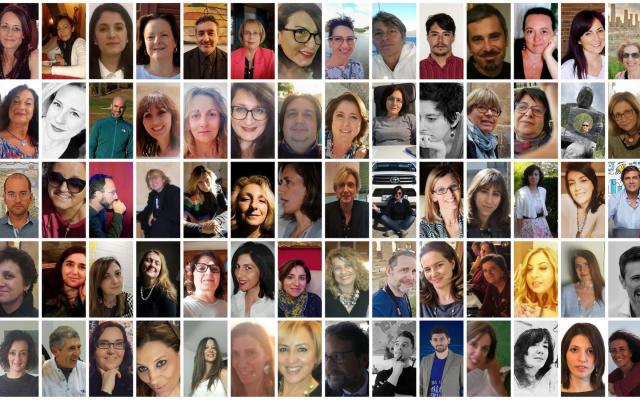From Tangram al Tic-tac-toe, how to learn whilst having fun with “Our School” Professors.
For our column on the “Our School” Professors Community, this week we share an interview with the authors of the tenth unit of Integrated and Sustainable Digital Citizenship in Primary School (Erickson, 2023), entitled "Strategy Games, Navigating in Time" and edited by:
- Paolo Aghemo, Lab Professors and Tutor Coordinator for Trainees in Primary Education Sciences (European University of Rome)
- Margherita Blandamura, Primary School teacher at the Istituto Paritario Sacro Cuore in Rome
- Chiara Ceccarelli, Primary School teacher at IC Pietro Vanni in Viterbo
- Daniela De Simone, Tutor, Organiser and Professor at the Faculty Primary Education Sciences (European University of Rome)
- Stephanie Falasca, Primary School teacher at Regina Angelorum in Rome
- Paola Pavone Salafia, Primary School teacher and PhD students in Teaching & Learning Sciences: Inclusion, Technologies, Educational Research and Evaluation (European University of Rome)
- Fabrizio Ragonetti, Primary School teacher
- Antonio Raimondo, Primary School teacher
- Patrizia Rispoli, Primary School teacher
- Silvia Silveri, Primary School teacher at IC Piero Angela in Rome
- Paola Tomasini, Primary School teacher at IC Fratelli Cervi in Rome
The unit intends to give value to games as a teaching strategy for the development of skills in a broad transversal and inclusive perspective. While, on the one hand, the focus on strategy games allows one to promote the development of mathematical skills, and especially problem-solving skills, the choice to turn to games from the past allows us to contribute to the development of a "historical consciousness," as per national indications, through a concrete and motivating experience.
COLLECTIVE INTERVIEW
Can you summarize the activity you personally followed and talked about in the book?
Coordinators Aghemo and De Simone. As university tutors of former students (SFP) and currently faculty, who participated in the “Our School” Project – specifically in the drafting of the last chapter of the book – we involved, coordinated, supervised, and provided support to the group in the process of designing, structuring, and implementing the project. We also intervened in the final drafting phase, to develop a chapter summarizing the experience that was concretely implemented involving different games in various schools.
Chiara Ceccarelli, Paola Pavone Salafia, Antonio Raimondo. The game proposed by the project is Tangram, due to its great versatility as an activator of inclusive, cooperative, and logically strategic teaching experiences. Starting from a historical framework and therefore of the values transmitted by the legend, students were involved in interactive and digital moments, also allowing them to acquire familiarity with the logical-functional aspects of the game. We reflected on the rules and peculiarities of the tool, paying particular attention to the fact that the seven geometric figures that compose it are effective and usable only complementarily; each part is indispensable to the others for success. The goal was to understand how this is not exclusive to gaming but applicable to everyday life, particularly in a school context. Starting from the Tangram rules, we addressed issues of diversity and inclusion in a linear and congruent way, also using digital material as a stimulus for creative solutions.
What was the added value of this initiative for students? Were there any additional activities or particular needs that emerged during the project?
Students activate reasoning and their ability to reflect on the parallelism that is created between game and reality, leading to personal experiences that can be compared to those of others, using their creativity and cooperating with classmates.
Silvia Silveri and Patrizia Rispoli. We designed an activity that would guide students to discover, learn, and play an ancient strategy game from the Latin tradition, terni lapilli, and its more modern evolutions, such as tic-tac-toe. The great added value is having achieved, even if with some initial difficulty, collaboration amongst students in small and large groups. They were not used to "doing things together" and for many of them it was not easy to learn to listen to each other and to discuss things peacefully, without imposing their own ideas. It took time and a lot of patience, but the project produced the desired results: everyone was able to provide a contribution actively and concretely. The result was a large and beautiful puzzle in which each student built and placed their own piece, without which the work would have been incomplete.
Stephanie Falasca and Margherita Blandamura. The game plays a key role in this activity, as it is used as a teaching strategy for the development of mathematical skills. In particular, we created the Ancient Egyptian board game called "Mehen." The work was divided into several phases. We began with an introduction and presentation of the game, followed by a thorough analysis and search for information. Then, following various proposals and reaching a common decision, the group worked on the game and the rules. Mehen has become a very popular game with the class, so much so that they created more than one set, in order to set up more gaming tables. From a scholastic point of view, it was interesting to investigate games from the past. Board games are often used by children, but using this approach in schools has attracted and involved students, also arousing a lot of curiosity about antiquity. It was certainly an added value for transversal skills, for learning to set goals, to use digital resources, to work in groups, and to enhance collaboration. In the end, there also were additional activities, as the children wanted to build other ancient games to play during recess, also sharing them with other classes.
Paola Tomasini. This educational project uses tic-tac-toe to develop logical-mathematical skills. Thanks to lab-based teaching, students actively participated in group activities, learning game rules and strategies. The teacher guided the process and stimulated the students' curiosity and interest. The goal was to develop cognitive, personal, and social skills through play. The added value lies in the promotion of mathematical and logical skills through a practical and engaging approach. By using tic-tac-toe as a learning tool, students learn and apply rules, strategies, and tactics to different situations. This not only makes learning more fun, but also provides a real-world context for developing cognitive, personal, and social skills. Furthermore, active student involvement and group work foster collaboration and dialogue, creating a stimulating and inclusive learning environment.
Fabrizio Ragonetti. The activity was to recreate "Master Mind," a logical-strategic game, in its original version, developed in America as "Cows and Bulls." The students, after understanding the mechanism of the game, based on possible combinations of coloured tiles, challenged each other to an elimination tournament, refining their strategies. They then worked in groups, creating their own version of the game, replacing the colours with different elements (such as symbols, colours, letters, numbers, etc.). Finally, they experimented with their creation, playing with it in groups and analysing possible weak points and strengths. Accurate research was carried out on the selected games and sharing the material proved an enriching element for the entire group. The discussion of a fun topic such as gaming gave us the opportunity to reflect on the possible playful implications of carrying out a lesson with the students, centred on the strategies that had to be adopted to win.




